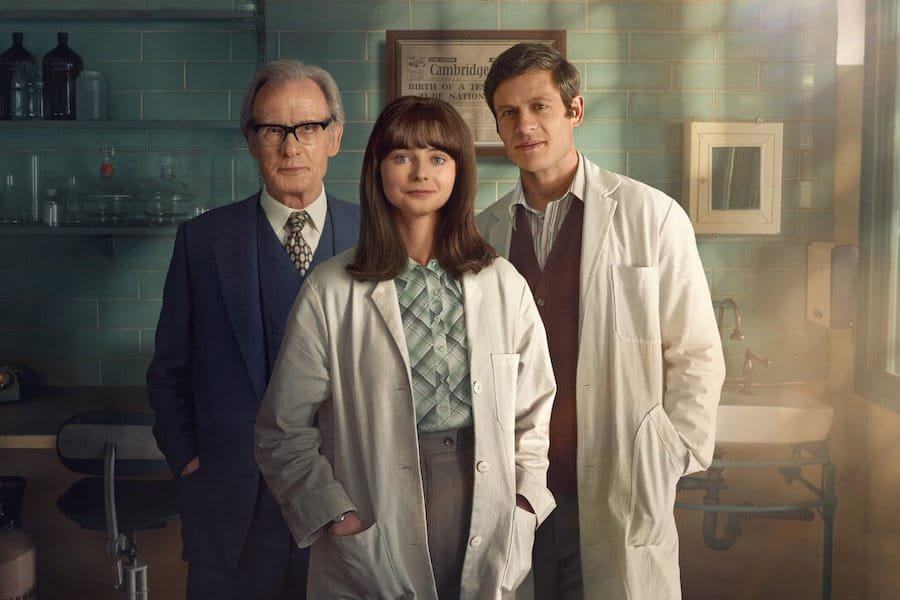Netflix’s "Joy": An Emotional Dive Into Infertility and the Birth of IVF
Few films have captured the raw complexity of infertility and the miracle of IVF like Joy. This film shines a light on the pioneers of IVF and their relentless dedication to creating a path for the 12 million babies born through IVF since 1978. As an IVF Warrior and someone who has deeply struggled with infertility, here are my thoughts on the Netflix film “Joy.”
Netflix: Bill Nighy, Thomasin Mckenzie, James Norton
Netflix’s "Joy": An Emotional Dive Into Infertility and the Birth of IVF
Infertility affects 1 in 6 people and 1 in 5 couples worldwide—yet the stigma and misunderstanding around it persist. In the U.S., 2.5% of all births are through IVF, and 2.5 million cycles are performed annually. These numbers are staggering, but they barely scratch the surface of the emotional toll infertility takes: the shots, the tears, the waiting, the sacrifice, and the unrelenting hope.
What Joy does so beautifully is put the humanity back into these numbers. It tells the story of the incredible pioneers—Dr. Robert Edwards, Patrick Steptoe, and Jean Purdy—who paved the way for the first IVF baby, Louise Brown, born on July 25, 1978, which is now celebrated as “World IVF Day.”
Emotional Rollercoaster: Sadness, Gratitude, and Hope
Watching Joy, I felt it all—gratitude for the pioneers who made IVF possible, anger at the ignorance and stigma surrounding infertility, and overwhelming sadness at how little progress has been made in dismantling these prejudices. The film highlights the battles these pioneers fought, not just against medical challenges but also societal judgment. It’s heartbreaking to see the parallels between their struggles and those we still face today—political interference in reproductive rights, stigma around IVF, and the lack of understanding about the emotional toll of infertility.
But Joy is more than just heartbreak—it’s hope. The filmmakers expertly balance historical storytelling with the raw emotional truth of infertility, ensuring the film resonates deeply while educating viewers about the magnitude of this breakthrough. It’s about the people who poured everything they had into making IVF a reality. It’s about the couples who endured failure after failure, the heartbreak of stigma, and the relentless hope that maybe, just maybe, this would work.
"There have been women here before you. And there will be women here after you. All sustained by hope. But knowing as they do, while it might not be better for them, for those that follow, without you, none of this works." Jean Purdy
I couldn’t stop thinking about the weight of those words. It reminded me of everyone who came before me, those before IVF was an option, those fighting so that IVF could be an option for people like me—and everyone who will come after, still battling stigma and systemic barriers.
From high costs, legal and political restrictions, and lack of comprehensive education or awareness surrounding infertility and treatment options, there is still so much work to do. The world desperately needs more films like Joy to open these conversations, challenge fertility stigma, and celebrate the victories of assisted reproductive technology (ART).
Is Joy Triggering for Someone Navigating Infertility and IVF?
If you’ve experienced infertility or you’re in the thick of IVF right now, this film will hit hard. From the gut-wrenching portrayal of the emotional toll infertility takes to the societal stigmas faced by couples in the past (and still today), the film doesn’t hold back. It’s heavy, raw, and deeply personal for anyone who has been touched by infertility.
The film highlights the stigma people faced in the early days of IVF, and it’s painful to see how much of that ignorance still lingers today. It shows the failures, the setbacks, and the relentless hope it takes to keep going. Watching it can be cathartic but also emotionally exhausting, no matter where you are on your journey. If you’re excited for Joy to be released to the world, but not quite ready to watch, give yourself permission to wait until you’re ready. If you do decide to watch, know that it’s okay to cry and feel it all. Tissues will likely be needed.
Final Thoughts: Why “Joy” Matters
I don’t think I’ve ever watched a film that made me feel so deeply. Joy is heavy, yes, but it’s also inspiring and beautifully done. It captures the science, the history, and the heartbreak in a way that feels deeply personal to anyone who’s been through infertility and IVF.
More than anything, it left me feeling grateful. Grateful for the pioneers who pushed through the judgment and failures to create something that’s given so many of us a chance at parenthood. Grateful for the people who continue to fight for reproductive healthcare today. And grateful for a film like Joy that isn’t afraid to tackle the tough stuff and open up conversations we desperately need to have.
This is a film everyone needs to see—whether you’ve been through infertility yourself or not. It’s emotional, educational, and necessary. If you watch Joy, be prepared to cry. But also be prepared to feel deeply inspired.
I’ll leave you with this: Joy is more than just a film. It’s a reminder that, even in the hardest battles, hope and perseverance can create miracles.
Watch the trailer for “Joy” which became available on Netflix on November 22, 2024.
Medical Disclaimer: The information provided in this blog is intended for general informational purposes only and should not be considered as a substitute for professional medical advice, diagnosis, or treatment. Always seek the advice of your healthcare provider or qualified medical professional with any questions you may have regarding a medical condition. Never disregard professional medical advice or delay in seeking it because of something you have read in this blog.

